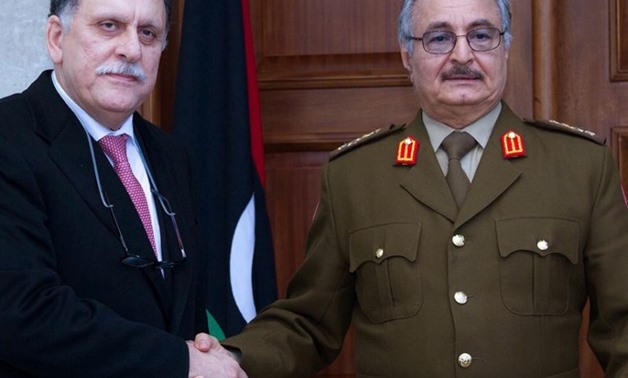
General Khalifa Haftar (R), commander of the armed forces loyal to the internationally recognized Libyan government, shakes hands with the head of the UN backed Libyan Presidential Council, Fayez al-Sarraj, in 2016- AFP
CAIRO – 20 December 2017: “I was against the Iraq War. I was against the Afghan War. I was against bombing Libya and Syria, but to be quite honest and with a heavy heart, because more innocent people are gonna be killed...We have to step in and help wipe out ISIS,” Cal Sarwar said in his book “The Cell, the Wolf & the Faith”.
On Sunday, Libya's national army commander Khalifa Haftar announced the end of the Libyan Skhirat Agreement and said he does not recognize any decisions issued by the political bodies linked to it, in reference to the Government of National Accord (GNA).
“The military institution will not submit to any party unless it has gained its legitimacy from the Libyan people,” Haftar said in a televised speech on Sunday.
He added, “We are fully obedient to the commands of the free Libyan people, as they are the source of authority and the real decision makers.”
When 22 Libyan parliamentarians signed the Skhirat Agreement in December 2015 in Morocco, they sought to end the civil war in Libya, which erupted in 2014. The Skhirat Agreement was put into practice on April 6, 2016.
The GNA, led by Fayez al-Sarraj, was the first concrete outcome from the Skhirat Agreement. The first meeting of the cabinet of the GNA took place on January 2, 2016 in Tunis.
Internal rift
Haftar’s announcement of the end of the Skhirat Agreement is a bad sign for stability and consensus, according to political observers and experts who spoke with Egypt Today.
Libyan Prime Minister Fayez al-Sarraj insists on moving forward without paying attention to the end of the GNA transitional period, which ended on December 18.
Upcoming Libyan elections in 2018
“Saif al-Islam [Gaddafi] will run for the upcoming presidential elections, which may take place in mid-2018,” Basem al-Hashimi al-Soul, Libyan tribal chief and spokesperson of the Gaddafi family, revealed to Egypt Today on Sunday.
Soul told Egypt Today that Saif al-Islam has prepared his platform and intends to issue it soon. “The platform includes some procedures that Saif al-Islam hopes the United Nations would adopt to help Libya move from the incumbent transitional period to stability.”
GNA Foreign Minister Mohamed Siala said Wednesday at the Valdai Club panel discussion in Russia that presidential elections in Libya may be held in mid-2018. “We believe that presidential elections will be held in the middle of 2018,” Siala told foreign reporters.
Arab media reports speculate that Haftar may run for the upcoming presidential elections.
Egyptian-Tunisian-Algerian summit on Libya
In a two-day tripartite summit, the foreign ministers of Egypt, Tunisia and Algeria convened in Tunisia to resume discussions over the security and political developments in Libya. Libya has become the largest security threat facing the Egypt, Tunisia and Algeria.
The frequent failures of international reconciliation attempts and the fall of weapons into the hands of different militant groups forced Egypt to play a major role in solving the Libyan crises.
According to the final statement published on social networks by Egypt’s foreign ministry spokesperson, Egypt, Tunisia and Algeria asserted their support of the political course in Libya as the only available political option for Libyans.
Egypt’s Foreign Ministry spokesperson Ahmed Abu Zeid affirmed the tripartite countries’ rejection of any form of escalation or foreign intervention in Libya by any party.
The three ministers reaffirmed their countries' support efforts to resolve the Libyan crisis, assuring their adherence to dialog as the sole basis for settling the Libyan crisis and rejecting any form of foreign interference in the country.
They expressed their appreciation for the efforts of U.N. Libya Envoy Ghassan Salama, hailing the political plan that he presented to address the Libyan crisis. They also urged all Libyan parties to show sufficient flexibility during the ongoing negotiations.
Egyptian role in achieving stability in Libya
Last week, President Abdel Fatah al-Sisi met with Fayez al-Sarraj, Libya’s chairman of the Presidential Council, and discussed political accords necessary to preserve Libya’s unity and integrity.
The meeting was attended by high-profile leaders from both sides, namely Libyan Foreign Minister Mohamed al-Taher, Libyan Finance Minister Osama Hammad, Egyptian Foreign Minister Sameh Shoukry, Egyptian Finance Minister Amr el-Garhy, Egypt’s Intelligence Chief Khalid Fawzy and the Egyptian ambassador to Libya.
Egypt’s presidential spokesperson Bassam Rady said that Egypt welcomes the frequent meetings of the Libyan military commanders in Cairo. He also stressed that Egypt confronts foreign proposals aimed at intervening in Libya’s domestic affairs.
“Sisi and Sarraj tackled means of cooperation between the two countries in combating terrorism and boosting international endeavors for developing a comprehensive strategy against terrorism,” the statement read.


Comments
Leave a Comment